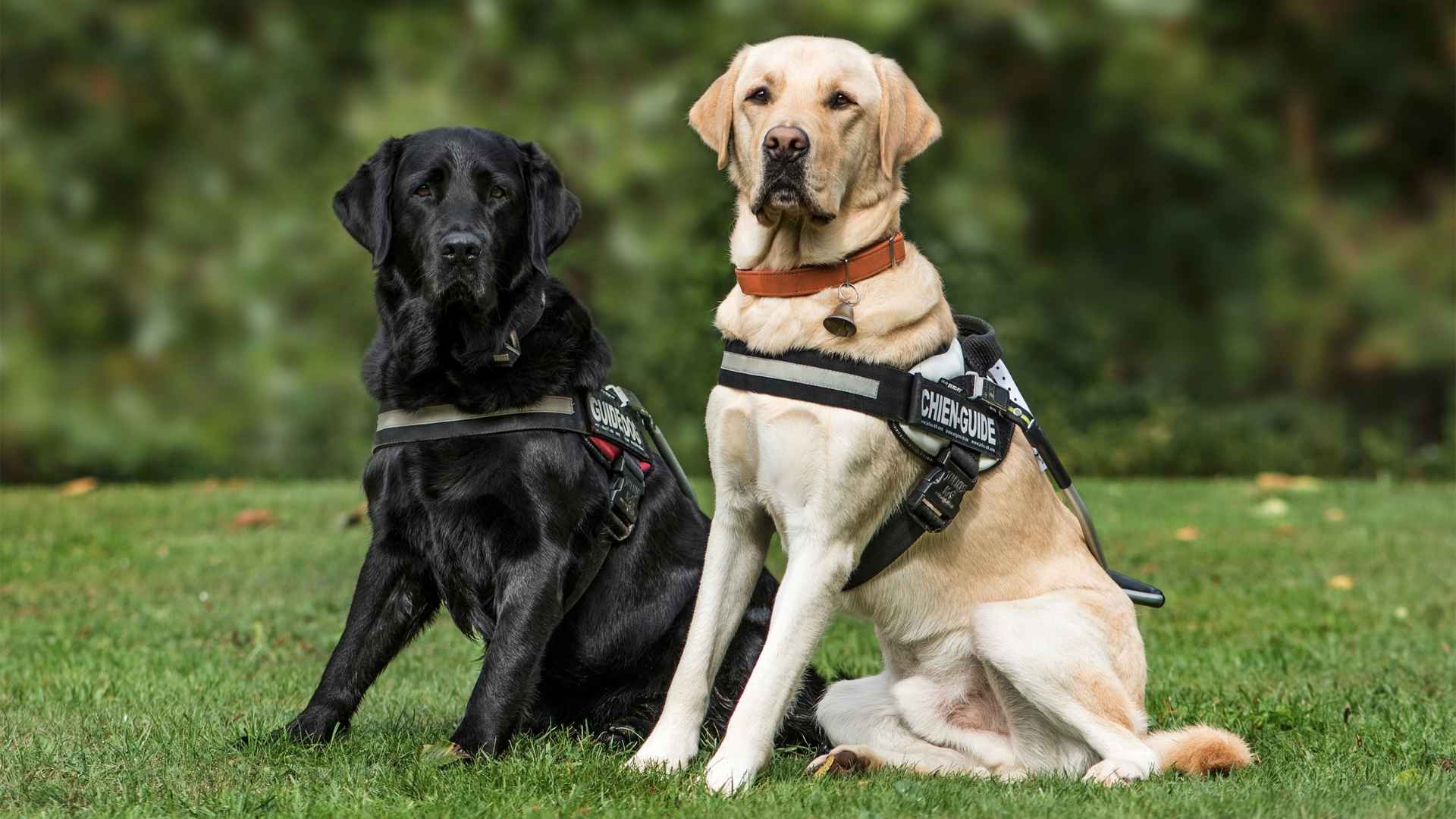When it comes to service dogs, brains are just as important as loyalty and obedience. The best service pups are calm, focused, and totally unfazed by chaos—think crowded sidewalks, honking horns, or a squirrel sprinting across the street. But here’s the kicker: not all smart dogs are easy-breezy to train. In fact, some of the brainiest breeds are also the sneakiest snack thieves and escape artists!
Intelligence in dogs isn’t just about learning tricks—it’s about problem-solving, quick thinking, and responding to their human needs in real time. That’s why only certain breeds make the cut as top-notch service dogs. These clever canines aren’t just smart—they’re emotionally tuned in, eager to please, and cool as cucumbers under pressure.
Ready to meet the Einstein-level pups that were practically born for the job? Let’s dive into the world of intelligent Service Dog Breeds and discover which four-legged geniuses truly shine.
Intelligent Service Dog Breeds
1. German Shepherd
With their iconic stance, alert ears, and loyal eyes, German Shepherds are born to serve—and they do it with style. These medium-to-large pups typically weigh between 75 to 95 pounds and stand around 22 to 26 inches tall. Agile and athletic, they can hit speeds of up to 30 mph (yes, that’s faster than your average scooter!).
What truly makes the German Shepherd shine isn’t just their looks or speed—it’s their outstanding temperament. They’re calm, confident, and eager to please, which makes them not only loving family dogs but also one of the common service dog breeds in the world.
Why German Shepherds Make Excellent Service Dogs?
Servicedog Training School states, German Shepherds are service dog trainers’ dream companions. Their size and strength allow them to assist with mobility, and their sharp minds mean they can learn just about any complex task thrown their way.
The following traits make them great service dogs:
Incredible intelligence: Quick learners who love solving problems.
Loyal and protective: They’ve got your back—always.
Emotionally intuitive: Perfect for psychiatric and emotional support work.
Strong and steady: Great for mobility and physical assistance.
Jobs German Shepherds Are Born to Do
These furry geniuses wear many hats—and they wear them well. From police dogs to helping people navigate the world to sniffing out allergens, German Shepherds are incredibly versatile. Here are just a few of the roles they absolutely crush:
Guide Dog for individuals with visual impairments
Diabetic or Allergy Alert Dog to sniff out danger before it strikes
Seizure Response Dog that senses and acts quickly in emergencies
Mobility Support Dog to assist with walking, retrieving items, and more
Psychiatric Service Dog and emotional support animals for those who need a calm, grounding presence
2. Poodle

Don’t be fooled by the stylish curls and show-ring struts—Poodles are working dogs at heart, and they’ve been at it for centuries! Today, they’ve traded in duck hunting for more noble jobs, like helping humans as service dogs.
While they’re famously known as France’s national dog, Poodles actually got their start in Germany as expert duck retrievers (the word pudel means “to splash” in German—adorable, right?).
Poodles come in three sizes—Standard, Miniature, and Toy—but it’s the Standard Poodle that steals the spotlight when it comes to service dog tasks. With their athleticism, smarts, and eagerness to please, they’re a favorite for tasks that require brains, focus, and a whole lot of heart.
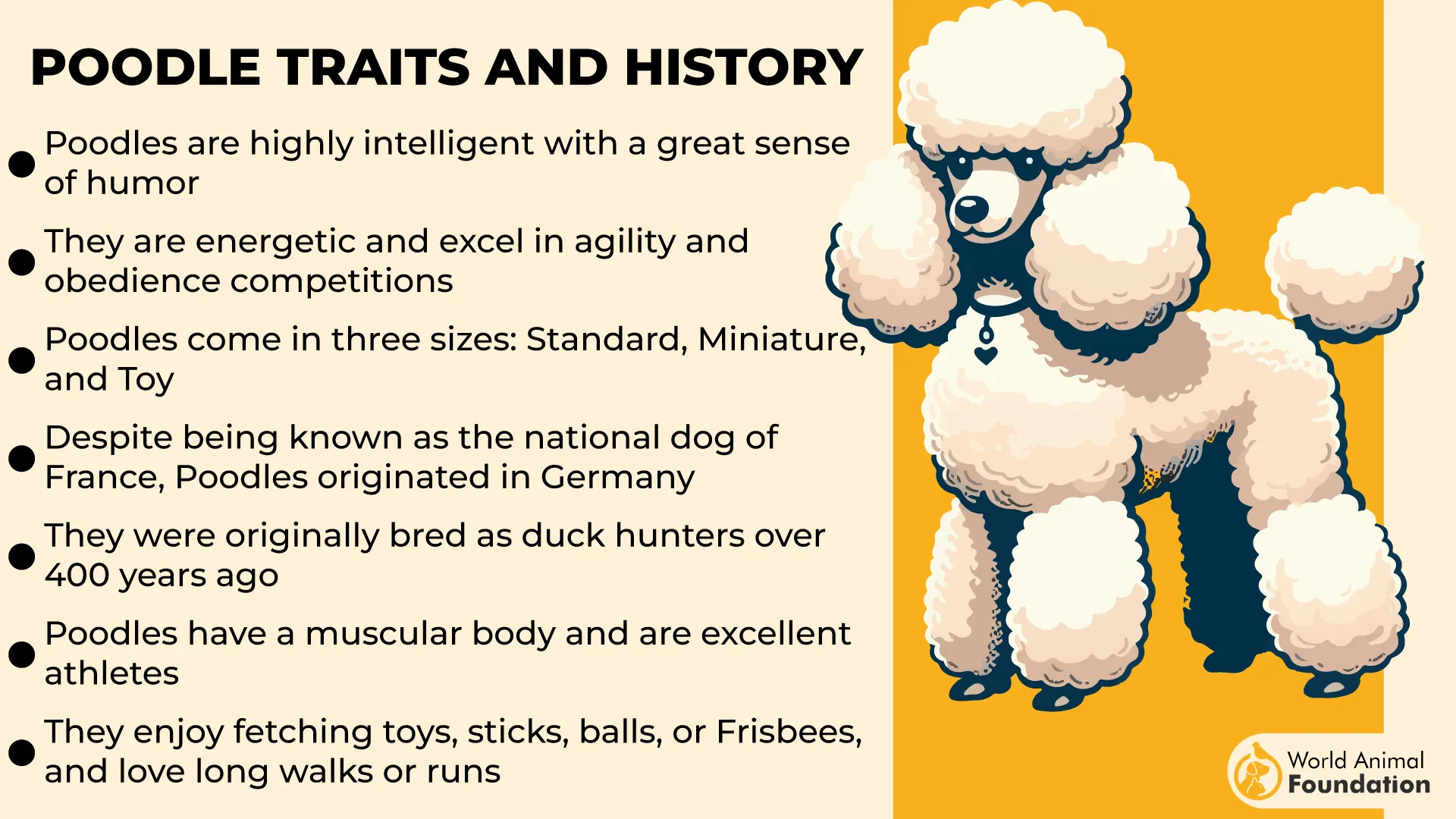
Are Poodles Good Service Dogs? You Bet!
While they might not be the first pick for mobility work due to their lighter build (especially Miniature or Toy Poodles), Poodles absolutely shine in service roles that require intelligence and responsiveness. They’re excellent for individuals with psychiatric, sensory, or medical conditions—thanks to their trainability and calm presence.
What Can a Poodle Service Dog Do?
Poodles are natural helpers and can be trained to perform a variety of life-enhancing tasks. Some of their specialties include:
Fetching items like phones, meds, or essentials during a panic attack or a mobility issue
Interrupting harmful behaviors, particularly for individuals with anxiety or OCD
Encouraging self-care with gentle nudges or cues to eat, take medication, or bathe
Calling for help using special equipment or alerting nearby family members
Providing tactile stimulation to calm someone with mental disabilities, helping them get back to awareness during a mental health crisis
Poodle Personality: Brains, Bounce, and Best-Friend Vibes
Poodles are known for their exceptional intelligence, ranking among the smartest dog breeds in the world. Training them isn’t just easy—it’s actually fun. They pick up commands like pros and genuinely enjoy having a job to do, and thus make them fantastic service dogs for a wide range of needs.
3. Labrador Retriever
It’s no surprise that Labrador Retrievers consistently rank as one of the most popular dog breeds in the U.S. Originally bred to work alongside humans, Labs were built for the job—whether it’s retrieving objects in the field or offering steady support as a service companion.
Labrador Retrievers are more than just lovable goofballs—they’re dependable, affectionate, and highly capable. With their friendly, outgoing personalities and deep loyalty, they’re naturally attuned to the needs of their human companions. Their steady temperaments make them a perfect fit for a wide range of service roles—from helping children with autism to supporting veterans with PTSD.
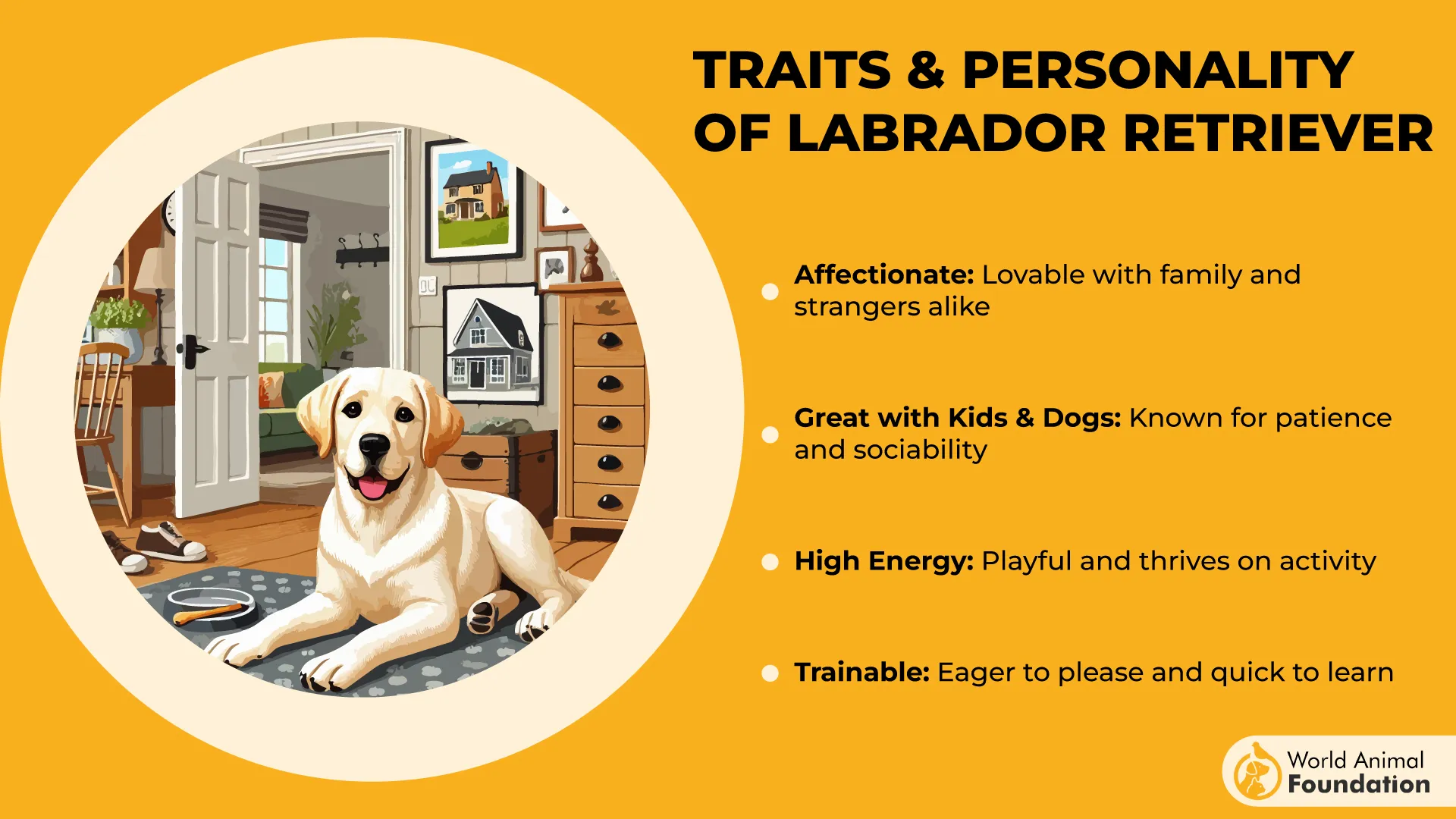
Labs’ history as working dogs shines through in their enthusiasm for training and natural problem-solving skills. At places like Freedom Service Dogs (FSD), Labs are taught over 60 specialized cues to assist with everything from retrieving items to providing deep pressure therapy during moments of anxiety.
They’re especially good at:
Opening doors and turning on lights
Fetching medication, phones, or other essentials
Interrupting nightmares or panic attacks
Creating personal space in crowded areas
Alerting to seizures or medical episodes
Labs strike that perfect balance of size—big enough to provide physical support, yet agile and gentle enough to perform delicate tasks. Weighing in around 55–70 pounds, they can easily put paws on counters, brace for balance, or act as a grounding presence during stressful moments. Their solid build and steady presence make them well-suited for both physical and psychiatric assistance work.
4. Golden Retriever
There’s a reason Golden Retrievers have held a top spot in the hearts of dog lovers for decades. With their signature golden coats, sunny personalities, and permanent puppy vibes, Goldens are just as happy snuggling on the couch as they are working by your side. These pups are the full package—friendly, smart, and totally in tune with their people.
What really sets them apart? Their gentle nature and eagerness to please. Goldens are social butterflies who love everyone they meet, making them incredible family dogs and equally amazing working companions. They’re naturally receptive to training, which makes service and obedience work feel more like a fun game than a chore.
What Golden Retrievers Can Do (Spoiler: A Lot)
With proper training, Goldens can perform a wide range of impressive and meaningful service tasks. Some of their standout roles include:
Guide Dogs: Golden Retrievers excel at helping visually impaired handlers navigate safely, thanks to their focus and alertness.
Mobility Assistance Dogs: They’re strong and agile, great at various tasks like retrieving items, opening doors, or providing balance support.
Therapy Dogs: With their gentle and intuitive nature, Goldens bring comfort in hospitals, schools, and therapy settings.

Born to Serve (and Snuggle)
Golden Retrievers are strong, gentle, and eager to help—ideal traits for service work. They assist with physical tasks like retrieving items or offering balance, while their affectionate nature provides emotional support.
5. American Staffordshire Terrier
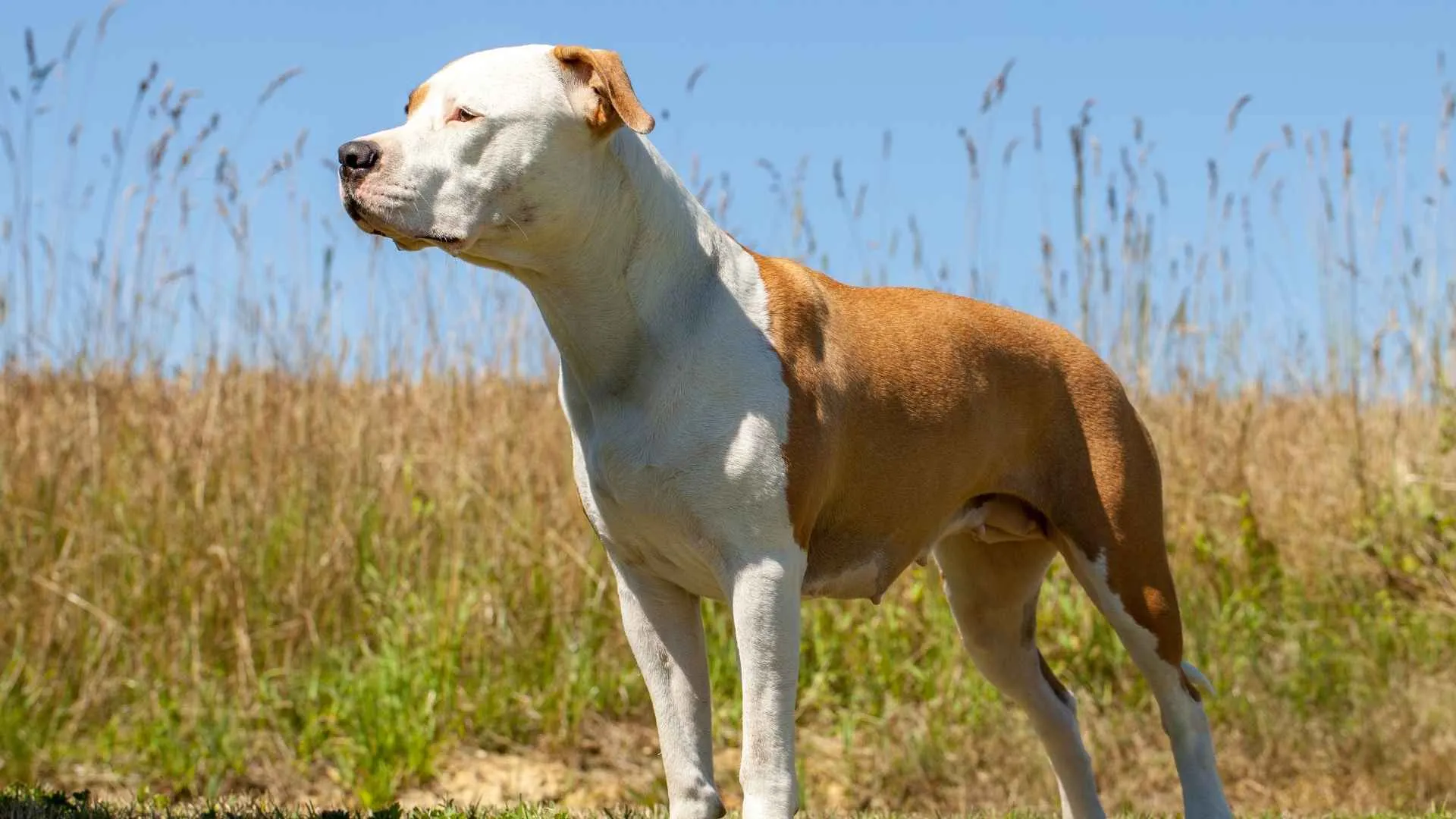
Don’t let the stocky build and powerful stance fool you—American Staffordshire Terriers (or AmStaffs, as fans lovingly call them) are softies at heart. These dogs are smart, confident, and full of loyalty, making them excellent service dogs in more ways than one.
Sure, their sturdy frame makes them ideal for mobility tasks, but their real magic lies in their emotional intelligence and people-pleasing nature.
WebMD states that a well-socialized AmStaff is alert, obedient, and forms strong bond with its people. They pick up on emotions like little four-legged empaths and often mirror the mood of those around them—especially as they mature.
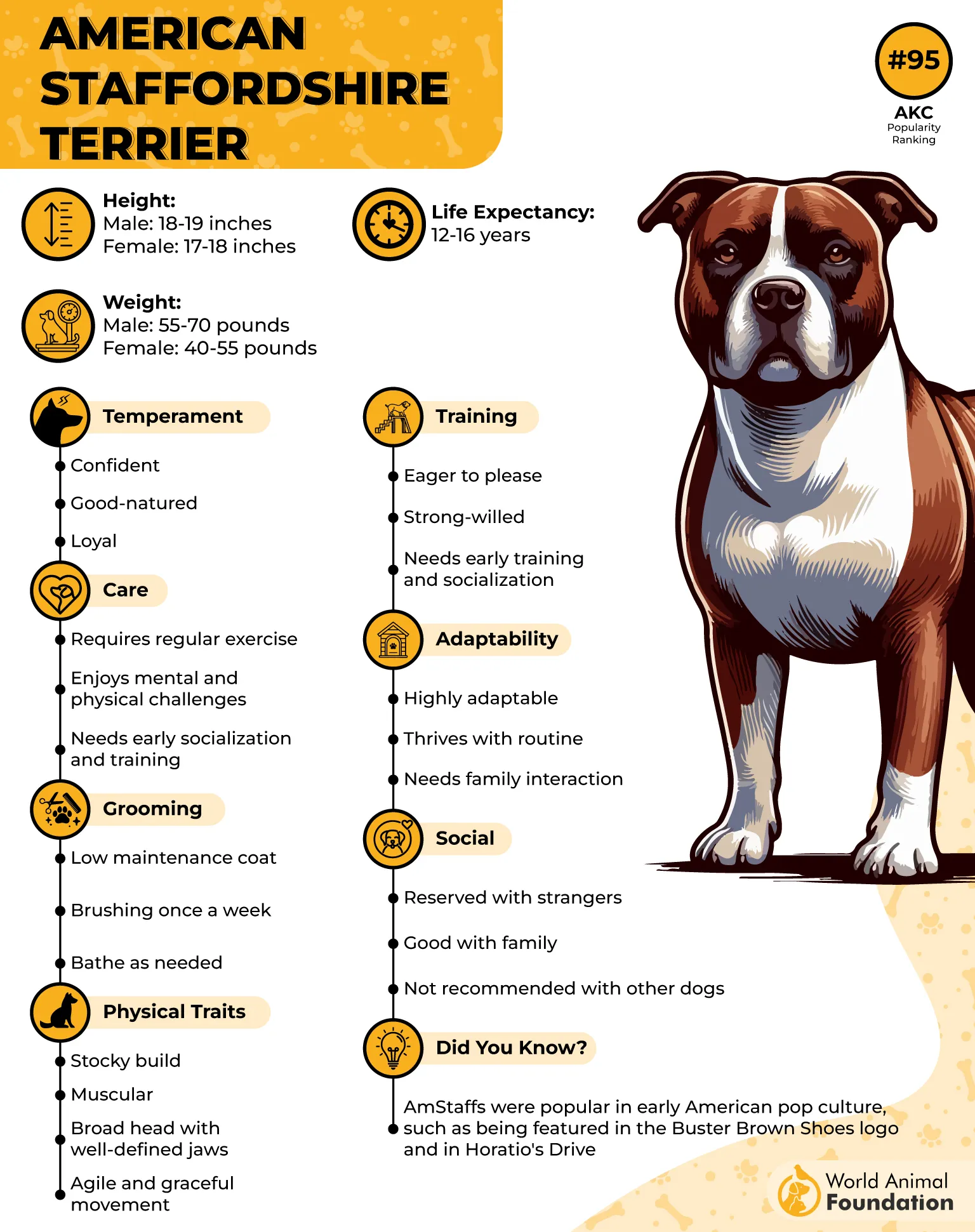
What Makes an AmStaff Shine as a Therapy Dog?
Certain qualities are essential in any therapy pup, and AmStaffs hit the mark—especially when they come from responsible, balanced bloodlines. The best candidates are:
Emotionally stable and resilient
Calm in response to loud sounds or sudden movements
Responsive to voice commands and touch
Naturally affectionate without being overly excitable
Patients often feel safe and accepted in the dog’s presence. The dog becomes a bridge, encouraging shy children to play, easing anxiety, and even helping people re-engage socially with siblings, classmates, or peers.
Changing Minds, One Wag at a Time
It’s no secret that American Staffordshire Terriers have a bit of an image problem. Often misunderstood as aggressive or dangerous, they’re actually one of the most loving and loyal breeds out there. Yes, they’re powerful, but they’re also gentle, goofy, and deeply in tune with their people.
In settings like clinics, care centers, schools, and even disaster areas, trained AmStaffs work wonders. They help people feel seen, safe, and comforted. Whether they’re interacting with children who have autism or adults with physical limitations, these dogs naturally build trust and emotional connection.
So here’s the truth: these dogs wear many hats—working dog, emotional support, protector, class clown, and most importantly, best friend. With the right care, guidance, and love, AmStaffs are more than capable of helping humans live fuller, happier lives.
6. Bernese Mountain Dog
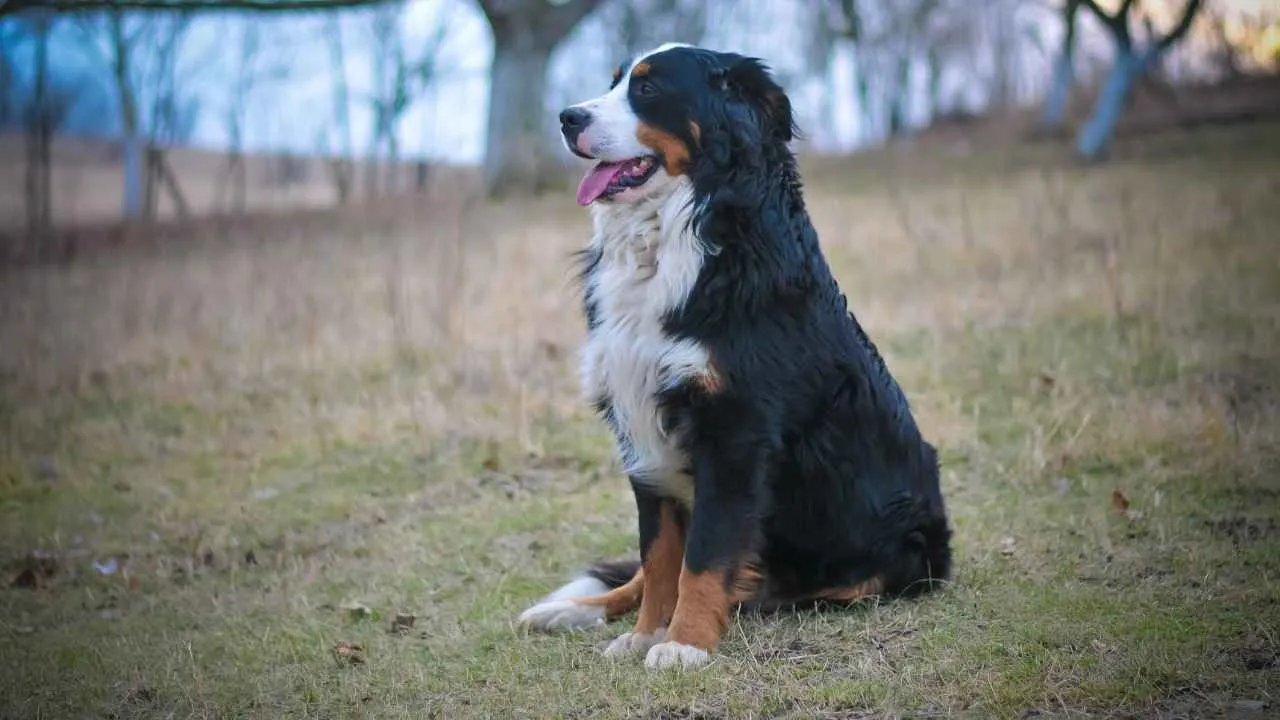
If you’re looking for a service dog that combines brains, brawn, and a laid-back personality, Bernese Mountain Dogs are absolute rock stars. These big, beautiful dogs are strong enough to support adults, pull wheelchairs out of tight spots, and fetch or carry items with ease.
While they shower their owners with love and loyalty, they tend to be a bit reserved around strangers—a handy trait that keeps them focused on their important jobs.
Why Bernese Mountain Dogs Make Awesome Service Dogs
As noted by WebMD, these tri-colored giants are not just a pretty face! Their smarts and gentle nature make them ideal for many service roles. Thanks to their quick learning abilities and calm temperament, Berners can handle a variety of tasks, including:
Deep Pressure Therapy: Using their weight and warmth to calm anxiety and help bring owners back to the moment.
Mobility Support: With a height of around 27 inches, they’re perfectly built to assist with balance, pull wheelchairs, and offer steady support.
Alert and Assistance: From warning owners about intruders to sensing low blood sugar or upcoming seizures, these dogs have your back.
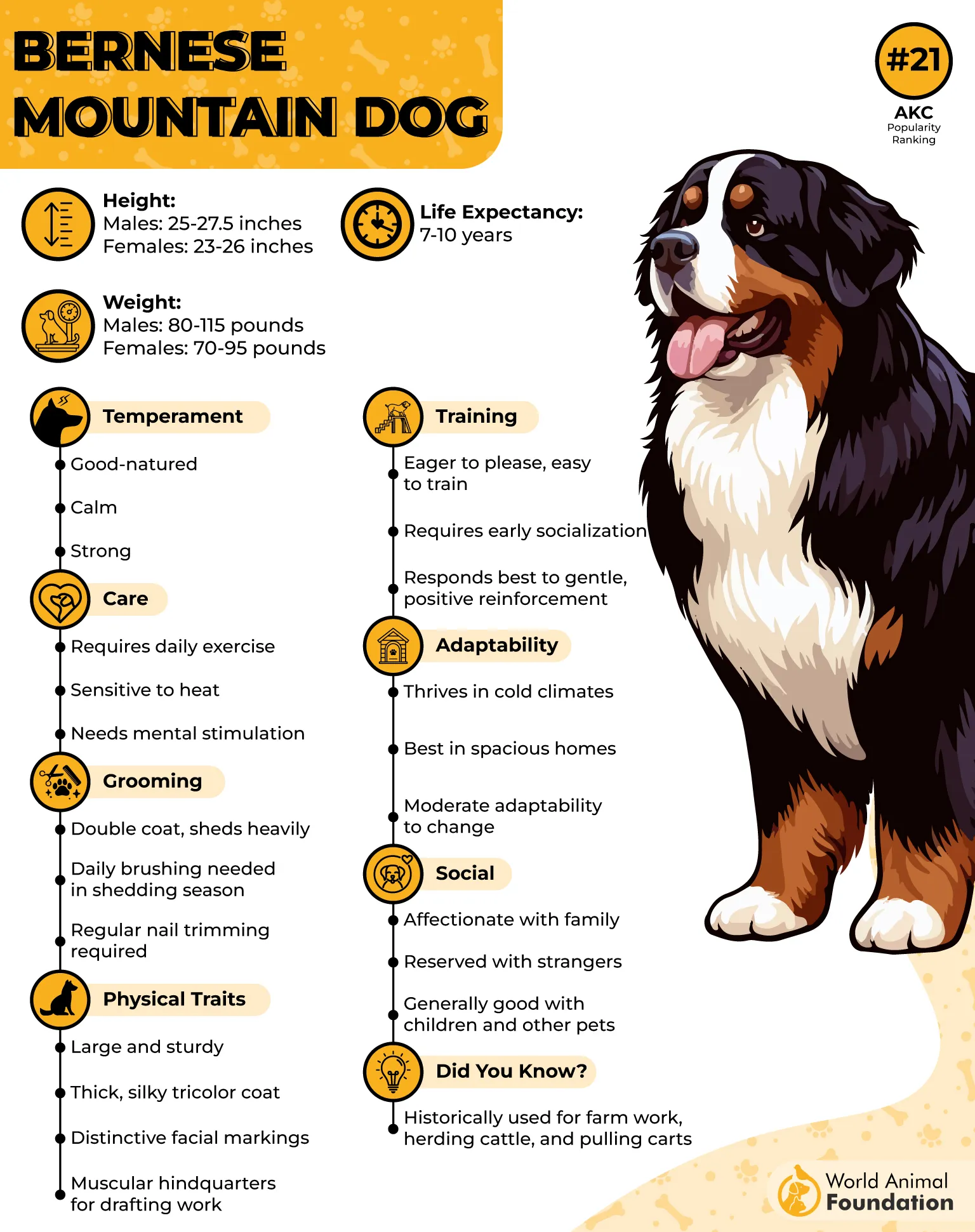
Personality Plus: What Makes a Bernese So Special?
Bernese Mountain Dogs ooze nobility and high intelligence—you can practically see it in their soulful eyes. They’re naturally hardworking and tend to bond closely with one special human in their family. Extremely friendly and gentle, they’re great with kids and love adding warmth and playfulness to any household.
Despite their impressive size, they surprisingly remain calm in busy or noisy public places. This makes them excellent companions for those needing physical or psychiatric support without the distractions of everyday life getting in the way.
7. Border Collie
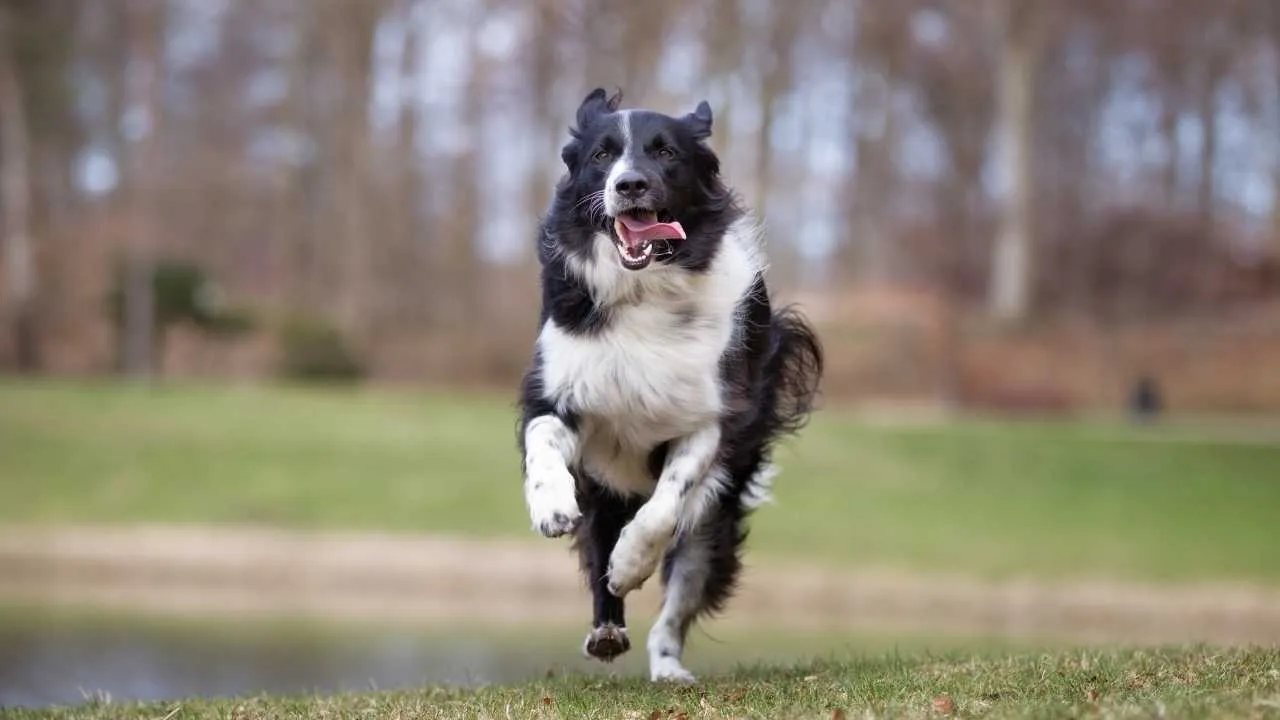
Border Collies are a popular breed, ranking 35th in popularity by the American Kennel Club—and for good reason! These dogs are the ultimate all-rounders, famous for their intelligence, boundless energy, and sweet personalities.
Originally from the hilly borderlands of Scotland and England, they were bred to herd sheep with a famous “Border Collie stare” — that intense, focused gaze they use to keep their flock in line.
Brainiacs of the Canine World
AKC states that these dogs are seriously brainy. In fact, they’re often called the most intelligent dog breed around! One Border Collie even mastered over 1,000 nouns. They’re quick learners who respond brilliantly to hand signals and body language. Their eagerness to please makes them fantastic candidates for service work, where adaptability and a strong work drive are key.
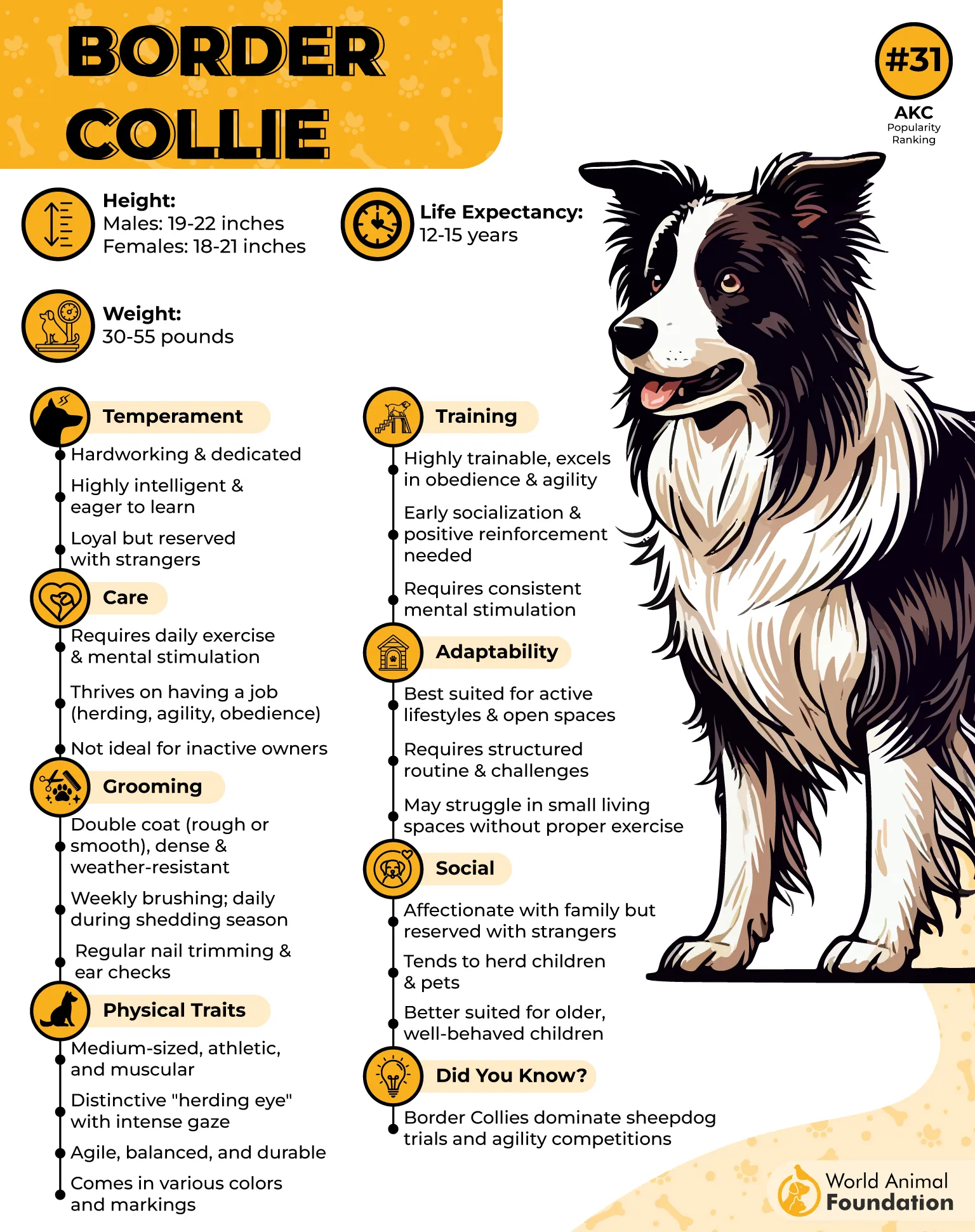
Don’t expect a Border Collie to lounge around all day—they were bred to work hard and keep moving! These pups thrive on physical activity and mental challenges, whether it’s herding, frisbee, agility, or dock diving. Without plenty of exercise and stimulation, their high energy can lead to some mischievous behavior at home.
Herding Instincts: Blessing and Challenge
Those strong herding instincts mean Border Collies are natural protectors of their “flock.” They’re sensitive to subtle changes in body language and often seem to know what you want before you say it. While this makes them excellent working dogs, it can sometimes lead to overprotectiveness, especially around unfamiliar people or situations.
For folks considering a Border Collie as a service dog, this trait requires thoughtful training. The dog needs to stay calm and friendly in public, as aggressive behavior isn’t allowed under the Department of Justice’s service dog guidelines.
Conclusion
While not all dogs are cut out for service work, the best breeds for the job share key traits: intelligence, trainability, and a calm, focused demeanor. From popular service dog breeds like German Shepherd Dogs, Golden Retrievers, and Labrador Retrievers to smaller companions like the Cavalier King Charles Spaniel, each plays a unique role in assisting people with physical disabilities, psychiatric conditions, or sensory impairments.
Whether it’s medical alert dogs detecting seizures, hearing assistance dogs responding to loud noises, or mobility-impaired individuals relying on larger breeds like the Great Dane or Boxers for support, service animals perform a wide variety of specific tasks. With extensive training, even a small dog can become a skilled hearing dog or emotional support partner.
While some breeds are more commonly seen due to their physical ability or temperament, other dogs—and even other animals—can succeed with the right service dog training. Ultimately, the goal is the same: to help people live more independent, confident lives with the support of friendly, hard-working, and dependable companions.


